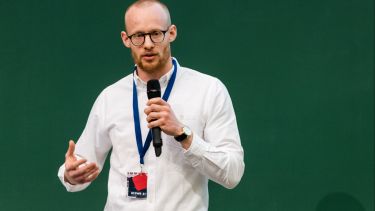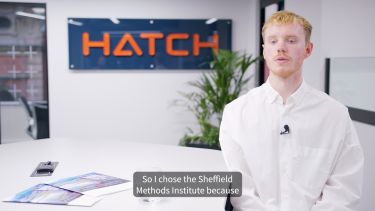Dr. Will Mason
A fairer society, all-knowing mentors and youth violence: Will tells us more about his interests inside and outside of work.

Favourite quote
'Authentic thinking, thinking that is concerned about reality, does not take place in ivory tower isolation, but only in communication'- Freire (1970: 50)
Describe your job in three words
Challenging. Dynamic. Busy.
How long have you worked for The University of Sheffield?
Since 2014.
What do you enjoy about the work you do?
I enjoy the freedom to pursue and explore matters that are of importance to me. I also value the opportunity to continuously learn and share, through research and student engagement.
What research are you working on now?
I’m currently working on two projects:
(i) A UK wide comparative study of child welfare inequalities. This Nuffield funded study explores the relationship between poverty and social work practice in child protection contexts.
(ii) Longitudinal community-based participatory work with young people and youth workers. This study engages a number of key themes including: race, marginalisation, identities, consumption and inequalities.
In one way or another all of my work explores the production and experience of inequality in contemporary society.
What would you like to be the ultimate outcome of your research?
A fairer and more equal society.
And how did you get involved with the SMI?
I applied for the job, and got it.
Do you have another area of research that you’re currently not working on that you would like to?
I’m in the process of developing some applied work related to serious youth violence. This is a topic that’s very close to me in my practice outside the university.
What kind of response have you received to your research/findings?
Responses have been varied both locally and nationally. We are really pleased that the Child Welfare Inequalities work has led to some reflective discussions and practice changes amongst social workers in England, Scotland and Northern Ireland. Northern Ireland has also recently published an anti-poverty social work practice guide that is informed by our work amongst others.
The community based participatory study has also generated some local interest, but uptake has been less clear. We are still in the fight.
Why is your research important? What are the possible real-world applications?
For me, the work is important because of its capacity to reveal inequalities in society, including (I think crucially) the culpability of well-meaning state interventions in the (re)production of structural inequalities.
Understanding the production and experience of inequality in our world has implications for the design and actions of institutions and services that support people to realise their capabilities. To address social issues we need to understand them, name them and act. “A failure to acknowledge… results in a failure to act” (Bhopal, 2018: 120)
Why is your area of scientific discovery important (or relevant) for the ordinary citizen of this country?
Because a more equal society is better for everyone.
What is your favourite thing about what you do?
Spending time with people I admire and respect, both inside and outside of the university.
If you could choose anyone, who would you pick as your mentor?
I already have fantastic mentors. They know who they are.
What is something you learned in the last week?
Last week I spent some time at the UNESCO Child and Family Research Centre in Galway. I learned all about the brilliant work they do to create the conditions for progressive policies, services and practices that improve the lives of children, young people and families.
What is currently on your bedside table?
A lamp. A whisky glass. A copy of Kalwant Bohpal’s new book, White Privilege.
Your top 3 favourite Books?
In no particular order (and it changes all the time):
- Becker, H. (1963) Outsiders. Chicago: Free Press.
- Hall, S., Critcher, C., Jefferson, T., Clarke, J. and Roberts, B. (2013 [1978]) Policing the crises: mugging, the state and law and order. Basingstoke: Palgrave Macmillian.
- Back, L. (2007) The art of listening. Oxford: Berg.
- Tuhiwai Smith, L. (2012) Decolonizing Methodologies. London: Zed Books.
- Freire, P. (1970) Pedagogy of the oppressed. London: Penguin.
… I know that’s five books.

Mae & Charlie are here to tell you more about Applied Social Sciences
Applied Social Sciences student Mae and alumnus Charlie will tell you what they enjoy most about the course, what skills they have learned and how it has helped develop their career.
